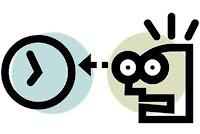 We’ve all been at the giving or receiving end of the ‘screens give you square eyes’ threat –probably both. Once we’re grown up and no longer worried about walking through the school gates with cubes in our eye sockets we tend to work out this was all just a well crafted myth.
We’ve all been at the giving or receiving end of the ‘screens give you square eyes’ threat –probably both. Once we’re grown up and no longer worried about walking through the school gates with cubes in our eye sockets we tend to work out this was all just a well crafted myth.The truth is that staring at screens won’t do an awful lot of damage to our eyes – it will likely result in a slightly increased chance of short-sightedness but with the inevitable wear and tear our bodies goes through in a lifetime this isn’t really going to produce much of a difference.
Still, this doesn’t mean that there aren’t some dangers to watch out for, and recent research at the University of Gothenburg has added stress, anxiety and even depression to the list.
Conducted over the course of a year on over 4,000 people in their twenties, the study concluded that there is a ‘central connection’ between computer use and mental disorders.
The Reason?
The main reason for the results was said to be the ease of spending longer than intended on the internet; we’ve all logged on to reply to an email and ended up on Facebook for the next hour.
Because of the inevitable pressure on our time that this creates, we tend to neglect other activities and personal needs, and this means that as well as feeling bad for not staying in contact with people or going to the gym like we said we would, we also suffer from a mental overload with all the things we didn’t do playing on our minds.
As well as this, the study identified that those who place a high importance on their phone will often feel guilty for not replying to messages or returning calls.
Even gamers are at risk; daily computer gaming for as little as one hour can be linked to feelings of depression, especially in women.

Gamers are at a higher risk to Depression
We are most likely to suffer from such disorders if using computers late at night, where a lack of sleep and sleep disturbances exacerbate the problem.
So What Should You Do About It?
The first step is to examine whether you’re likely to be effected. From there, the team suggest that you regulate your screen usage as well as demands on your availability in an effort to avoid stresses.
The average user spends 1 hour and 15 minutes a day on Facebook, and reducing that is a great example of how to start.
When Push comes to Shove...
We start worrying only when push comes to shove, don't we? Well, I've given you a start to work with. Will you rethink how you are spending your time on the computer? Let me know.. Wanna Share This?

